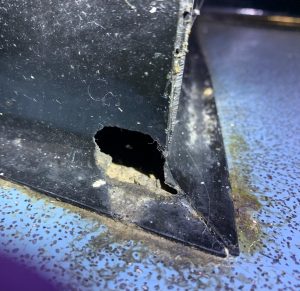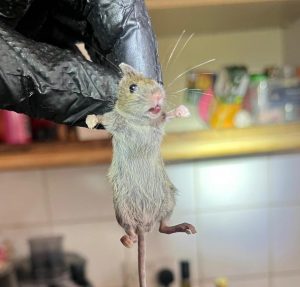Top-Rated Mouse Control Services In Bromley And South London
Signs Of A Mouse Infestation
Mice are relatively large rodent pests, so you will probably see them running around. Since they can sometimes use wall cavities to get around and might build nests in your loft, you might want to look out for other signs of mice.
Like most rodents, including rats and squirrels, mice have incisors that never stop growing, so to keep their teeth healthy ,they have to chew almost constantly. You might notice gnaw marks, as well as paw prints, mouse droppings and scurrying noises.
If you notice signs of mouse activity, you need to take immediate action before they cause significant property damage. Pest Relief offers mouse pest control services throughout London and the South East, covering South East London, Bromley, Croydon, Crowborough, Horsham, Purley, Sutton, Sevenoaks, Sidcup and Tunbridge Wells. Call 0800 0029 187, and a professional pest controller will be ready to help remove your mice infestation.

Professional Mouse Control For Homes And Businesses

A mouse infestation can cause major problems for homes and commercial businesses across Bromley, London and the South East. Homeowners can be distressed by mice, which carry diseases that can spread to humans. They also cause damage to furniture and property that can be expensive to repair.
Businesses also need to control mice promptly, as a rodent infestation is very obvious and can cause reputational issues.
That’s why homeowners and business leaders both need to be proactive and book a visit from Pest Relief. For significant infestations, we can provide same-day responses to get rid of mice before they cause major issues. Mice spread diseases and can contaminate food sources, so it’s vital that you remove them from your London property quickly and efficiently. Contact us to book your a visit from our expert mouse exterminator.
Mouse Control Bromley FAQs
The best way to eradicate mice is to work with expert pest controllers like Pest Relief. DIY mouse control products are often ineffective and can be toxic to children and pets. Our team are RSPH Level 2 Certified, so we have access to mouse control products that aren’t available to the general public. As soon as you notice signs of pest activity, get in touch, and our team will remove the mice and block entry points to stop these persistent rodents from returning.
It is impossible to truly prevent mice, but it is possible to make it harder or less likely for them to gain entry to your property. The most effective solution is to block access points and stop them from getting food. Consider using airtight containers for dried food and making sure household waste is secured so mice and other rodents can’t get to it. Wire wool can be used for DIY mouse proofing, but if you notice significant access points, consider working with Pest Relief for professional pest proofing and treatment.
An individual mouse sighting might not be a major issue, but mice breed at an alarming rate, so a small mouse problem could quickly turn into a significant infestation. Once they’ve found a reliable food source and comfortable shelter, mice are unlikely to leave on their own, so you need to be proactive and work with a pest control company like Pest Relief to remove the mice from your property.
Mice are incredibly flexible and can hide in tiny spaces, including wall cavities, loft spaces, behind appliances, cupboards and other areas that are sheltered and seldom used by humans or pets. Kitchen pantries and other areas that are close to a food source are also popular hiding places for mice.
Mice can spread diseases to humans, including hantavirus, salmonellosis, and leptospirosis. Additionally, if there are dead rodents or mouse droppings in your home due to a mouse problem, then these can decompose and cause bacteria and make your space unhygienic. If mice are able to access your food, they could contaminate it and cause food poisoning or other problems. As such, it’s vital that you
In the UK, there are several mouse species found, including house mice, field mice, harvest mice and yellow-necked mice. The house mouse is probably the most commonly found indoors, as other species, such as the field mouse, also known as the wood mouse, and the harvest mouse, prefer to be outside and will only venture indoors in extreme weather or if they urgently need to find food.
